- Home
- Mark Zubro
Ring of Silence Page 19
Ring of Silence Read online
Page 19
The worst of it lasted maybe three minutes. In ten minutes, the wind had eased. Although it was still raining, the sky lightened, and Turner realized the sun had not yet set on this long June day. He glanced at his phone. One radar loop showed the actual worst of the storm had passed two miles south of them. The line of the most severe storms had passed their area but was intensifying over northwest Indiana.
He and Fenwick began checking on the people nearest. Others were gathering themselves, checking on friends, punching at cell phones.
Beyond their shelter, the intensity of the rain continued to slacken. They saw shambles of strewn everything.
In a few more minutes, the rain let up, as often happened after the worst had happened, with surprising quickness.
Other than minor cuts and scratches, these people had survived. In the last light of the day, people began to straggle out to their nearly gone encampment. A girl about twelve ran up to the little kids Turner and Fenwick had saved and gave them towels. She led them away.
Alan Wolfe gazed at them. Using his cane, he swayed, and shook his head. “You saved those children.” He paused a moment. “And me.” His eyes were moist and not from the rain. Someone gave him a blanket. He pulled it close around him.
Turner asked, “You want to go back to your tent and check your stuff?”
Wolfe shook his head. “This isn’t my first camp-out. Anybody stupid enough to bring valuables to a protest is too stupid to care about. They might as well be Republicans.”
Turner heard the sound of an emergency vehicle rise and fall. He and Fenwick called home. Their families were fine. Ben said, “We watched the radar on the television down in the basement. There was an actual brief tornado touchdown in Morgan Park. By the time the line of storms got to us, it was dissipating.”
Jeff and Brian were outside helping Mrs. Talucci with branches that were strewn on her lawn from the aged oak tree in the front yard.
Turner’s soaked clothes clung to his skin. Fenwick looked like a beached whale that had somehow gotten tangled in someone’s side-yard laundry line.
Turner called the station. After ascertaining all was okay at both ends of the phone, Barb Dams told them Molton’s orders were for them to stick to their case.
Friday 7:31 P.M.
They turned to Wolfe. The two detectives tottered with him to a bar on a nearby corner. The electricity was still on in this part of the city. They found a booth in the back. They ordered sandwiches and sodas. They sat in their squishy, wet clothes. Fenwick showed his cop ID and managed to get a couple of clean towels from the bartender. The three of them used the towels to remove the worst of the wet. Turner couldn’t wait to change, but he wanted to get this interview in as quickly as he could.
Turner said, “We wanted to get some background on Preston Shaitan and Henry Bettencourt.”
“They hated each other. They were traitors in league with each other. The more extreme Shaitan sounded, the more reasonable Bettencourt sounded. They raised money off of each other. Sometimes, I wonder why we even bother to protest. It’s not like we’re going to do much good.”
Fenwick shook his head. “Some protests do make a difference. And why am I arguing their efficacy with you? You’re the protester.”
Turner returned them to questioning for the case. “How’d you get along with Shaitan?”
“Biggest asshole in the universe, but I never actually met him.”
“Bettencourt?” Turner asked.
“He was an egomaniacal moron who didn’t know how to organize his way out of a paper bag.”
Turner knew Fenwick loved people they questioned who had nasty things to say about the victims. You rarely got good or useful information from those who loved the dead.
“We’ve been told by a number of people that he was a great guy, and that everybody loved him.”
“Everybody but one, and anyone with sense.”
“Why didn’t you get along?”
“I was an idea guy. Bettencourt was practical, willing to sacrifice ideology to practicality.”
Fenwick said, “We thought this whole protest was your idea.”
“It was.”
“But he got involved.”
“I’m an idea man. I’m the starter.”
“Ah,” Fenwick said, “The guy in the background who urges others to go risk themselves.”
Instead of the sharp rejoinder Turner expected, Wolfe smiled and said, “Safer that way.”
“So who got invited, and how did they get invited?”
“My idea was to invite everyone, left, center, right. What’s most surprising is the right wing showed up. The real enemy of all of us is the 1%. They’re the ones who killed Bettencourt and Shaitan.”
“Anyone specific on that?” Fenwick asked.
“No. And you’ll never find anyone specific from the 1% to arrest and prosecute. You’re not that naïve. I hope.”
“Why kill them?”
“They’re as semi-famous as anyone. Although Bettencourt would have been a specific kind of danger. He may actually have been able to get the groups to work together. The 1% doesn’t like that.” He took a sip of coffee. “See, they’d prefer us all to be working drones and slaves who the police can kill with impunity if they are inconvenienced.”
For one of the rare moments Turner was aware of, Fenwick didn’t interrupt to debate.
The older man continued, “The 1% don’t mind ravers and screamers. In the long run, they’re ineffective and can be safely ignored. It’s the hard workers and the organizers who are the danger.”
“Danger to what or to whom?” Fenwick asked.
Turner wanted to nudge his partner’s wounded arm to maybe shut him up.
“Danger to them. They really have nothing to fear, but keeping others afraid keeps them in business. Keeps me in business too, for that matter. It can be pretty symbiotic and incestuous.”
Fenwick asked, “You meet with the 1% to plan all this?”
“Well, no, but it’s kind of obvious what’s going on to anyone who is paying attention.”
“Did Bettencourt meet with them?”
Wolfe leaned over the table toward them. “The fixer for the 1% is in town. He’s Danny Currington.”
Turner noted down the name. “You know where he’s staying?”
“With the 1%.”
“How does anyone get in touch with him?”
“Find a mover and shaker in town. They’ll know.”
“You’ve never met with him?”
“Once in Key West when I was on vacation. Purely an accident.”
“Who else?”
“It would be hard to pick specific leaders. Starts out as mostly disorganized, angry anarchists. Young protesters are mad at older protesters. They accuse them of being out of touch. Many of these groups were one or two people and even then they didn’t last. Bored nut cases. They had fights over who was to be the designated speaker to the media.”
Turner tried again, “How about a few names? Maybe a few of the angriest, or most out of touch, or most anarchistic?” He mentioned a couple who were the ones Father Benedict had brought to them. Useless.
Fenwick asked, “How about this Guns for Gangs group?”
“Westerton’s crowd? That started out as a joke.”
Fenwick said, “I don’t hear anyone laughing.”
“Not now. But we were then.”
They gave up on him. They helped him back to his tent. He picked out a few soaked belongings.
“Where will you go?” Turner asked.
“I have a suite in a quiet hotel just off Michigan Avenue. Nobody here knows about it. No way am I really going to sleep on the ground. I’m too old for that shit.”
“You’re all charlatans?” Fenwick asked.
“No more than the 1% who convince all those sheep to vote against their own interests. They get theirs. Why shouldn’t I get mine.”
“Did you kill them?”
“Why bother? We’re all ch
arlatans in some way.”
Fenwick gaped at him and said, “You’ve swallowed your own Kool-Aid.”
“Some of us have turned it into a lifestyle.”
“Then why bother with any of this?” Fenwick asked.
“People want to. They’re comfortable with this. It’s fun to walk down the canyons of a big city and listen to your chants echo off the buildings.”
Fenwick said, “Not everyone is that cynical.”
Turner tried one last time. “Anyone specific either of these guys had fights with?”
Wolfe had no names.
They left. As they walked away in the still close air, Turner said, “I think the oddest thing we’ve got is someone else claiming to be us walking around asking questions.”
“Who the hell thought that up?” Fenwick asked.
“More to find out,” Turner said.
Sanchez and Deveneux came hustling up to them. Sanchez said, “We’ve been looking for you. The Commander wants to see you.”
“Why didn’t he just call us?”
“It’s some secret thing. I don’t know what. He trusted us not to blab.”
A small child began trotting toward them as fast as its tiny legs would carry him. His mother chased after. The little kid kept looking at the ground near them and shouting, “Bear, bear.”
Sanchez leaned down and picked up a child’s teddy bear. He stood back up and then lurched forward.
Friday 8:27 P.M.
Then they heard the gunshot. They all saw Sanchez fall and start to bleed. He moaned. The woman picked up the kid and ran.
They all ducked down. They got themselves and Sanchez behind the nearest tree. He was hit just below his vest on his torso.
With one hand, Turner kept pressure on the wound. He said, “We’re not going to get an ambulance with all this chaos. We’ll take him ourselves. I’ll keep pressure on the wound.”
Fenwick agreed. Deveneaux rushed for the squad car, drove it over the grass to them.
While they waited, Turner noted that about a foot above the wound he was staunching, part of Sanchez’s protective vest had been ripped and torn. So there had been at least two shots. Sanchez moaned. Turner kept repeating, “You’re okay. We’re getting you to a hospital. You’re okay.”
When they got Sanchez stretched out onto the back seat, he was unconscious but breathing. His blood only oozed slightly from the wound.
Deveneaux flipped on the siren and drove like mad to the hospital. Turner stayed in the backseat. Fenwick hustled for their car and drove over. They got Sanchez onto a gurney, into the hospital, and into an emergency bay with medical people in attendance.
Storm victims added to the wild crush at the hospital. In the chaotic waiting room all the seats were taken. People lined the corridors and clumped in the halls. Turner and Fenwick found a spot in an obscure corner and leaned against a wall.
Turner stared at the second hand of a clock high up on the wall. His clothes were wet. His hands covered in Sanchez’s blood. He shut his eyes a moment, opened them, and said, “I can’t wrap my head around it. We’ve had a number of deliberate attacks on us, or deliberate attempts to fuck up our case. Who the fuck benefits from doing both?”
Fenwick heaved his bulk away from the wall and paced twice up and down the hall. He stopped then said, “My clothes are too wet for me to pace in them. I think my underwear is permanently stuck in my crack.”
“More information than I’d care to have at this moment or any moment.”
Fenwick asked, “Why shoot at Sanchez?”
“Or were they shooting at us?”
“They’re trying to kill us?”
“I’m trying to keep an open mind, but ‘yes’ strikes me as a logical answer to that.”
“Who?” Fenwick asked.
“One of your better rhetorical questions.”
Fenwick said, “I want to hurt someone or something.”
“Not yet. First, we figure out what the fuck is going on and then we act.”
“You’re that calm?”
“I don’t have someone to direct my anger against. If I direct it randomly outward, innocent people could be hurt.”
Fenwick looked at his friend. He said, “I’m glad you’re my partner.”
“Mutual.”
They stood in silence until some minutes later, Fenwick said, “They’re all old.”
“Huh?” Turner was semi-used to his partner’s comments out of mid-air apropos of nothing.
“I expected young people. Isn’t it the young who protest angrily?”
Turner asked, “How does that relate to murder and this case?”
“Motive. People get pissed.”
Turner said, “I’d rather have forensic evidence.”
“That is so like you. Proof. Tangible, something you can present in court. Sigh. You never change.”
“It’s a curse.”
Friday 10:29 P.M.
Beat cops and detectives clustered around the emergency room doors. Turner and Fenwick joined them.
One guy asked, “Were they shooting at you guys or Sanchez or both?”
Turner said, “No one knows.” He wasn’t going to discuss any aspect of what was happening to a bunch of cops some of whom he did not know. He asked, “How is he?”
Deveneux said, “They’re working on him.”
A very skinny, heavily-bearded man rushed up to the desk. He wore tight cut-off jeans that clung to his butt and upper thighs. His T-shirt was paint splattered. He wore black socks and running shoes at the end of very hairy legs.
He announced, “I’m Dave Sanchez’s husband, Alvi Baqri.”
The nurse said, “One moment, sir.”
Turner and Fenwick knew him. They hurried over.
Baqri asked, “What happened?”
Turner said, “We were there. We saw it happen. His vest saved him. He took two shots, direct hits. The vest got tore up but saved him from a torso shot. But one got him just below the vest, on the top of his butt.”
It wasn’t a secret where Sanchez was. A cordon of cops surrounded the bay where he was being tended to. Fenwick led the way. The group parted. Deveneux was just coming out of the room. He hugged Alvi. Deveneux led him into the room and then reemerged himself. He strode over to Turner and Fenwick. He said, “I wanted to give them some privacy.”
“How is he?”
“Drugged up, but alert. Waiting for test results. He thinks the shots were meant for you guys and that his movement at the last second got in the killer’s way.”
“Possible,” Fenwick said.
Turner thought this was likely, and that they were lucky.
Commander Molton rushed up to them. “How’s Sanchez?”
“He should be done with the doctor soon. Nothing life threatening. He’s being prepped to have surgery to take the bullet out. His husband is in there with him.”
A beat cop stood guard.
Molton said, “I wanted to talk to you guys.” He’d been carrying a bundle of clothes. “We got these from your lockers at the station. We used the master key to get in. I figured you’d want dry clothes.”
They thanked him, changed in the washroom. Turner scrubbed at his hands, wrists, and arms. He tried running cold water on the spots of blood on the shirt he’d been wearing. Much of the blood sluiced away. They came back, and sat down next to Molton who had also brought sandwiches and soft drinks.
Molton turned to a passing hospital person and asked if there was a private room. They were led to one with no windows, blond furniture, and pale gray walls. The chairs had strips of leather on them. Not as uncomfortable as some hospital chairs.
“First, are you guys okay?”
Turner said, “I’m not sure.”
Fenwick said, “Something is fucked up.”
Turner said, “I agree.”
Molton said, “We’ve got to figure out for sure if someone is trying to kill you two, and if so who. I know, none of us believes in random coincidence, but we ca
n’t absolutely rule it out. And then there’s the goddamn murder case. And the tenuous, but I don’t think we can ignore, too-much-of-a-coincidence, Carruthers incident. Either of you think the shot that hit Sanchez was meant for him, not you?”
They shook their heads.
Molton drummed his fingers on the table top, moved his chair back and forth.
Fenwick gobbled his sandwich. Turner nibbled his.
Turner asked Molton, “What’s wrong?”
“I’ve been in meetings all day. About you guys, process, procedures, investigations, publicity. Meetings with just about everybody from the superintendent on down.”
Fenwick said, “What the fuck?”
Molton said, “Precisely.”
Turner put a restraining hand on Fenwick’s arm. Turner asked, “What’s going on?”
“What isn’t? An example, you know how you guys did that huge computer monitor spread sheet for the case about the cardinal and his crew?”
Nods.
“You’ve heard of the Lavery incident, the cop back in 1982 who testified for the defense, and it all came out about Chicago cop secret files, and how we weren’t supposed to do that anymore.”
More nods.
“Well, your cardinal case is being used against you for keeping secrets.”
Turner said, “We sent copies of all of that to everybody except the press. From the superintendent on down. We got commendations.”
“It’s being investigated.”
Fenwick gaped. Not a curse escaped his lips. Turner guessed he was more flummoxed than he’d ever seen his partner.
“You know that rape case you guys solved a few years back?”
“Which one?”
“Where you found the DNA evidence to exonerate the guy. Supposedly there’s a tape of a Cook County prosecutor feeding false information allegedly from you guys to the prosecutor to convict the guy instead of finding him innocent.”
Fenwick banged his fist on the table. “Bullshit. We found the DNA to exonerate him.”
“You’ve seen the tape?” Turner asked.
Molton nodded. “Mostly it shows a blur, but they want to use it against you.”
“Who is against us?”

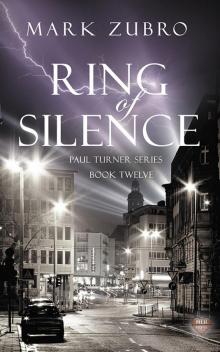 Ring of Silence
Ring of Silence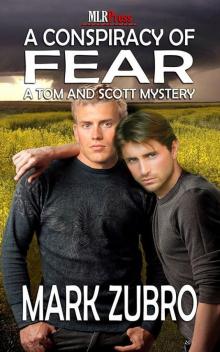 A Conspiracy of Fear
A Conspiracy of Fear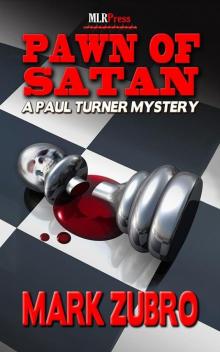 Pawn of Satan
Pawn of Satan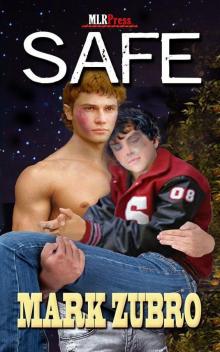 Safe
Safe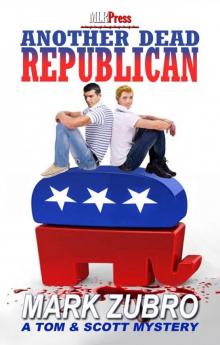 Another Dead Republican
Another Dead Republican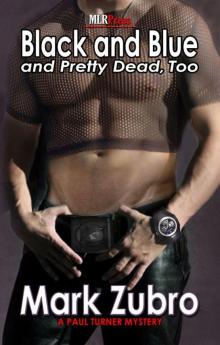 Black and Blue and Pretty Dead, Too
Black and Blue and Pretty Dead, Too Alien Home
Alien Home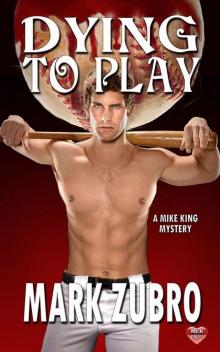 Dying to Play
Dying to Play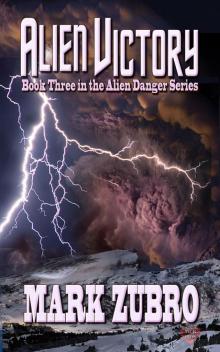 Alien Victory
Alien Victory